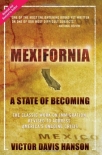Mexifornia: A State of Becoming, Victor Hanson [cool books to read .txt] 📗

- Author: Victor Hanson
Book online «Mexifornia: A State of Becoming, Victor Hanson [cool books to read .txt] 📗». Author Victor Hanson
This possible fate leaves the borders as they are, profits from the continued use of cheap labor and ignores illegality. It mitigates the social effects of a demographic free-for-all by returning to the old, proven assimilationist model of the nineteenth century, which Americanized millions of Poles, Irish, Jews and Italians, who also came to America without money and en masse.
Alternatively, we could patrol our border - to be sure, requiring fortification and a militarization of sorts - to ensure only legal and vastly reduced immigration, perhaps at a national rate of no more than 150,000 or so legal entries per year from Mexico. Business would have to accept a permanent scarcity of unskilled workers. Californians in turn would pay more for their hotel rooms, lawn care and fresh fruit - and have to do more of their dirty work themselves. In theory, American citizens without specialized skills would find themselves in far greater demand and would acquire greater leverage in negotiating more than minimum wages. Under conditions of such strict legality, illegal immigrants would have to be deported immediately. Controversy arising from offering tuition discounts and issuing driver's licenses to those who arrived illegally would disappear. Respect for the law would strengthen. Population growth would reach a natural equilibrium in California, perhaps forty million by the end of the new century. As a trade-off for such vastly reduced immigration from Mexico, we would not worry so much about the multiculturalism taught in our schools. The fighting for inclusive standards and worry over a watered-down, feel-good curriculum would go on, but lose some of its intensity without the presence of millions of illegal newcomers. The La Raza dinosaurs, along with other separatists and ethnic chauvinists, might lumber on in theory, but in fact would gradually die off as their habitat became depleted of new clients and their landscape altered through the effects of intermarriage and the assimilative youth culture.
Within twenty or thirty years, Mexican ancestry would be comparable to Italian descent today. Cinco de Mayo would be no different from Columbus Day. Chicano studies professors, hobbling with canes and walkers, would scour the campus for a handful of Mexican immigrants they could imbue with distrust of America and its racist past - but for the most part encounter a completely assimilated third-generation student body who paid them little heed.
In short, we the hosts can either change our strategies about assimilating the immigrant flood or, alternatively, remain unchanged but dam the source of the deluge and do so under legal auspices. Either choice would radically alleviate the present problem within a few years. A third, more radical and holistic - and, I think, wiser - solution would be to adopt sweeping restrictions on immigration and put an end to separatist ideology along with the two-tier legal system for illegal aliens. In such a scenario, our present problems would vanish almost immediately, while prices for wage labor would steadily escalate.
There is, of course, a fourth approach - the logical culmination of the present policy - which leads to a true Mexifornia. If we do not change by either adopting an assimilationist program or insisting on metered and legal immigration, or both, we shall soon see a culture in southern and central California that really is a hybrid civilization, a zona libre not unlike what already exists in parts of inner Los Angeles and many rural California towns such as Orange Cove, Mendota, Malaga and Parlier. We know the warning signs of that rendezvous with tragedy for aliens when entire communities are Hispanicized. At present, 70 percent of the Los Angeles public school enrollment is reportedly Latino; only 10 percent is "white" - in large part because an entire middle and upper class has simply fled to private schools or more upscale public districts in the suburbs, practicing a self-interested apartheid even as it professes ideals of selfless liberality.
Under such a logical continuation of present policy, Spanish, de facto, becomes coequal with English; poverty becomes endemic; the federal and state governments replace the impoverished municipality as the salvation of last resort; schools erode; crime soars; and there seems to be little cultural opportunity for integration and Americanization. Many of those mired in these communities soon attempt to migrate to more integrated towns, as if it is not enough to make it across the border, but rather, real opportunity requires reaching towns that are not essentially simulacra of those found back in the Old Country - a pattern similar to other immigrant experiences from the very beginning of our history.
The Central Valley town of Parlier or Mendota could be the model for large parts of California if immigration remains unchecked. In that case, legal and illegal status becomes increasingly irrelevant for the basics of public life - college tuition, driver's licenses, welfare eligibility and perhaps soon even voting privileges. In the bilingualism that emerges, a new argot of Spanglish, neither Spanish nor English, is mastered as a language to be read and written with little real facility, while waves of newcomers, whether literate or not, demand or at least expect Spanish-only businesses and social services. Provocateurs in the race industry, government, and academia all





Comments (0)